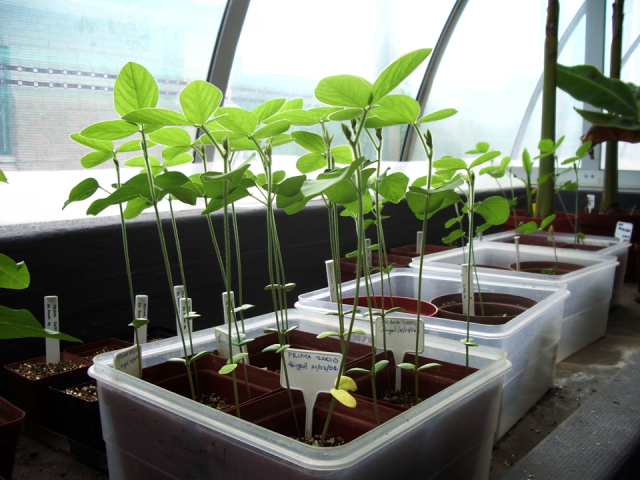The Molecular Plant Physiology group was established in 1998 when Professor Karl Kunert joined FABI. Since then the group has grown and is currently headed by Dr Juan Vorster. We collaborate with various groups from around the world, each brining unique specialities, to understand plant development and the response of plant towards stress. Using a multi-disciplinary approach we hope to obtain a holistic view of the changes in the plant under stress. On a genomic level we have studies stress induced mutations and rearrangements of the genome, we are also using transcriptomics to study and identify genes and pathways that are important during the stress response. On a protein level we are especially interested in the role cysteine proteases as well as cysteine protease inhibitors play during development and senescence. Here we make use of in silico protein modelling to study protein-protein interactions as well as to predict the effect of mutations on inhibitor binding. Through protein engineering and enzyme kinetics we then evaluate the effect of these changes on inhibitor strength and specificity. We also measure protease activity and changes in the REDOX state in different tissues and under different stress conditions. To complement the molecular data we also follow and characterize various physiological and phenotypic changes in the plants we study. The ultimate aim is to identify usable molecular, biochemical or phenotypic markers that can be used to develop plants better adapted to stress in a changing environment.
Molecular Plant Physiology

New Publications
Cullis C, Chimwamurombe P, Kunert K, Vorster J. (2022) Perspective on the present state and future usefulness of marama bean (Tylosema esculentum). Food and Energy Security :1-11.
10.1002/fes3.422 
Reinhardt CF, Vorster BJ, Kupper A, Peter F, Simelane A, Friss S, Magson J, Aradhya C. (2022) A nonnative Palmer amaranth (Amaranthus palmeri) population in the Republic of South Africa is resistant to herbicides with different sites of action. Weed Sience
10.1017/wsc.2022.9 
Tremblay J, Goulet M-C, Vorster J, Goulet C, Michaud M. (2021) Harnessing the functional diversity of plant cystatins to design inhibitor variants highly active against herbivorous arthropod digestive proteases. The FEBS Journal
10.1111/febs.16288 
Sukhorukov AP, Kushunina M, Reinhardt CF, Bezuidenhout H, Vorster BJ. (2021) First records of Amaranthus palmeri, a new emerging weed in southern Africa with further notes on other poorly known alien amaranths in the continent . BioInvasion Records 10(1):1-9.
10.3391/bir.2021.10.1.01 
Kunert KJ, Botha A-M, Oberholster PJ, Yocgo R, Chimwamurombe P, Vorster J, Foyer CH. (2020) Factors facilitating sustainable scientific partnerships between developed and developing countries. Outlook on Agriculture 49(3):204-214.
10.1177/0030727020939592 
Singh AA, Tsekoa TL, Morris L, Steinkellner H, Mach L, Whaley K, Zeitlin L, Pauly M, Vorster J, Bhiman JN, Gerber I, Alexandra K, Stoychev SH, Lotter-Stark T, Kwezi L, Pooe O, Chikwamba R. (2020) Plant-based production of highly potent anti-HIV antibodies with engineered posttranslational modifications. Scientific Reports 10:6201.
10.1038/s41598-020-63052-1 
Malefo M, Mathibela O, Makgopa E, Crampton BG. (2020) Investigating the role of Bowman-Birk serine protease inhibitor in Arabidopsis plants under drought stress. Plant Physiology and Biochemistry 149:286-293.
10.1016/J.PLAPHY.2020.02.007
Kunert K, Vorster BJ . (2020) In search for drought-tolerant soybean: is the slow-wilting phenotype more than just a curiosity?. Journal of Experimental Botany 71(2):457-460.
10.1093/jxb/erz235 
Mbedzi PP, Van den Hooven L, Vorster BJ , Van der Waals J. (2019) Screening for Sclerotinia sclerotiorum resistance using detached leaf assays and simple sequence repeat markers in soybean cultivars. Crop Protection 215:104909.
10.1016/j.cropro.2019.104909 
Kibido T, Kunert K, Makgopa M, Greve M, Vorster BJ . (2019) Improvement of rhizobium‐soybean symbiosis and nitrogen fixation under drought. Food and Energy Security :e117.
10.1002/fes3.177 

